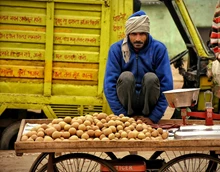
Drought has forced Utah farmers to make difficult decisions as spring and summer approaches. One farmer has already purchased a new watering system in order to save water for the future. Willard Bay is currently 60% lower than it was at this time last year. When you combine that with a less-than-ideal snowpack, this summer could be very similar to last year.
We may take for granted the produce in our supermarkets that ends up on our dinner tables.
"We're definitely in a drought cycle, and it's very difficult," Kenny McFarland said. He is one of the many farmers who make up Syracuse's Onions 52.
Now that he's entering his third year of drought, he's taking a different approach.
"We've changed the crops we grow, as well as the way we water our crops," he explained.
Over the last six years, he's converted hundreds of acres of onions to drip irrigation, which reduces evaporation and sends water directly to the crops. It was expensive.
"How much it conserves depends on the crop," McFarland explained. "A rough estimate that I've come up with is roughly half of the water." It is effective with onions, but not with all crops.
McFarland believes that difficult decisions must be made now about future housing developments and how we water.
"I'm still young enough to be concerned about the next 35 years." "What keeps me awake at night is wondering what my children will do to be able to farm successfully," he added.
"It is really up to state and local governments, as well as water providers, to ensure that we are sustainable as a community in 20, 30, 100 years," he says.
McFarland believes that homeowners should be able to use their water in the same way that farmers do. However, he believes that better planning is required before Utah's growth becomes unmanageable.











